Beijing’s Olympic moment
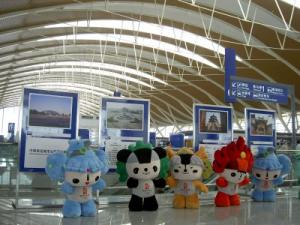
 Beijing 2008: The cute "Fuwa" mascots
Beijing 2008: The cute "Fuwa" mascots
The roar of 90,000 Chinese fans rose along with Zhang Wenxiu’s hammer as it arced through China’s National Stadium. Cheers exploded into thunder as her score vaulted into first place – and a shot at Olympic gold – in the women’s hammer throw event. Even for foreign visitors, the passion and pride of the Chinese was unmistakable – the entire nation’s eyes, and hopes, centered on its athletes.
These Olympics were China’s moment to shine, which it had been preparing for a long time. From the moment we cleared immigration at Beijing Capital Airport’s brand-new Terminal 3 – the largest airport terminal in the world – we were greeted by dozens of Olympic volunteers eager to help. The Olympic hype was all over the city, from the banners lining the Airport Expressway into downtown, to the futuristic architecture of the new athletic facilities scattered around the city, to the cute “Fuwa” Olympic mascots pretty much everywhere.
The Olympics provided the perfect opportunity for Beijing to showcase its newly modern, confident, even exuberant self. The most visible result of China’s all-out push for modernization has been its buildings. The striking elliptical latticework of Beijing’s now-famous National Stadium – which earned it the “Bird’s Nest” nickname – is just one example. In the eastern part of the city, the CBD (Central Business District) is full of newly built steel-and-glass office towers, including the equally groundbreaking CCTV (China Central Television) headquarters, a bizarrely-shaped loop of horizontal and vertical elements around a central open area. And underground, freshly opened and gleaming subway lines were ready for passengers.
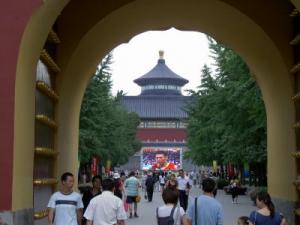
 Ancient meets modern: Olympics at the Temple of
Heaven
Ancient meets modern: Olympics at the Temple of
Heaven
Also striking were Beijing’s new middle class citizens, moving forward with a brash confidence completely unlike what I saw when I first visited the city ten years ago. Leaving the past behind, Beijingers are finally shaping their own futures, especially China’s youth, who have the least to fear, the most to gain and are eagerly embracing change. Indeed, they now look like youth anywhere else, with loud T-shirts, designer jeans – and the attitude to go with it. For these two and a half weeks though, Beijing residents of all kinds slowed down at television screens in electronics stores, subway cars and even at the Ming-dynasty Temple of Heaven, enthralled by China’s newly minted stars in gymnastics – diving, shooting and a host of other Olympic sports.
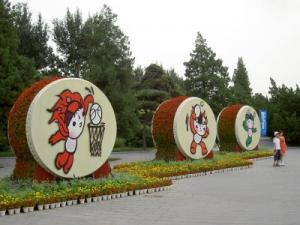
 "Fuwa" mascots Huan Huan, Yin Yin and Ni Ni
"Fuwa" mascots Huan Huan, Yin Yin and Ni Ni
My American hosts lived in the high-tech Zhongguancun neighborhood, in Beijing’s northwestern university district. Taiwanese-Americans who moved to China to start a software company, they had moved right into China’s technology heartland, with Microsoft’s office tower visible down the street, in an office park along with Sun Microsystems and Google. Like other foreigners living in Beijing, they had also seized the opportunity to buy dozens of Olympic tickets and were attending events almost daily. Best yet, from my perspective, they were only minutes away from the Olympic venues.
The Olympic Green

 The Water Cube at the Olympic Green
The Water Cube at the Olympic Green
On my third day in Beijing, after touring the Temple of Heaven the first day and attending a Cuba vs. Korea baseball game on the second, my hosts and I finally made our way to the Olympic Green, home of the Bird’s Nest, the Water Cube and the National Indoor Stadium (home of gymnastics, among other sports).
To Beijing’s credit, everything worked perfectly, from the special Olympic bus lines bringing visitors in from around the city, to the thousands of smiling volunteers in blue-and-white uniforms offering help in an array of languages, to the event tickets with embedded RFID chips that allowed for quick computerized scanning. (The RFID chips might seem to be overkill, except that the “real” China waited just outside the Olympic fences, where hundreds of scalpers were hawking trinkets, patriotic flags and tickets at grossly inflated prices – even though some of them were clearly fake.)
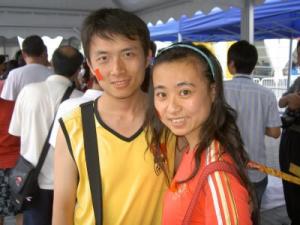
 Patriotic young Chinese
Patriotic young Chinese
Walking into the Olympic Green was slightly surreal – it was more like a vision of Beijing’s possible future than the reality of its present. Chinese tourists – and the crowd was mostly Chinese – were awestruck by the avant-garde facilities, especially the sinewy, whimsical Bird’s Nest stadium. A man from Zhejiang province looked a little lost, literally and figuratively, within this amazing landscape, and asked me to take several pictures for him, as if to prove to himself that he was really there.
Indeed, once inside the Olympic fences, the “real” Beijing melted away – the city’s crowds were replaced with open space, and instead of the cacophony of traffic, dreamy music lingered – or rather was piped – into the air (“One World, One Dream” was the Beijing Games’ official slogan). The bright, clear sunshine in a city usually regarded as one of the most polluted in the world added to the unreality of the day. Even the more cosmopolitan family from Beijing that I spoke to was amazed and happy to witness this piece of history.
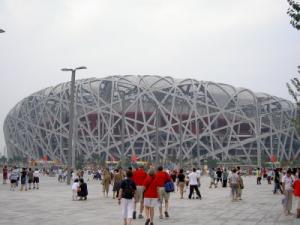
 The Bird’s Nest stadium
The Bird’s Nest stadium
Inside the Bird’s Nest, we and the other international visitors looked on as 90,000 Chinese fans yelled, waved flags and cheered China’s athletes on to their eventual first-place finish, with 51 total gold medals. That night, we watched the preliminary heats for the men’s 800-meter and 5,000-meter runs, the women’s 200-meter semifinals, qualifying rounds for the pole vault, the women’s hammer throw final (and the medal ceremony a bit later), and the men’s 110-meter hurdles semifinal, among other events.
On a sad note, the hurdles did not include Chinese track superstar Liu Xiang, who had withdrawn from his preliminary heat with a hamstring injury two days earlier, a huge disappointment given China’s extraordinary expectations of him. (Zhang Wenxiu, the Chinese hammer throw athlete, also had to settle for bronze.) Not every story can go according to plan.
The “real” Beijing
Indeed, hidden beneath the unprecedented preparations and seemingly flawless management of the Games was a deep anxiety pervasive in Beijing – one the government tried, unsuccessfully, to hide. Certainly, the well-publicized controversies such as the use of army soldiers as “volunteer” performers in the opening and closing ceremonies, and the replacement of seven-year-old singer Yang Peiyi by the prettier Lin Miaoke (who then lip-synched to the original girl’s voice) betrayed the government’s underlying insecurity that China might not really be ready.
In addition, a series of extraordinary regulations, such as the removal of half of Beijing’s cars and the shutdown of factories all over the region pointed to the very real fact that, under normal circumstances, Beijing would be too polluted, too congested, and simply too messy to successfully host the Olympics.
Less visible to international reporters were skeptical questions being asked by ordinary Chinese citizens, such as whether spending $40 billion on one truly spectacular show was really worth it in the end. The taxi drivers I spoke to expressed pride for China, but really cared more about earning a living. Indeed, business for them and millions of others was actually worse during the Olympics given Beijing’s tightened traffic, security and visa regulations, resulting in a city that was strangely empty – everyone not there for the Olympics basically stayed away. For these everyday Chinese, life in the chaotic and increasingly unequal China will be no easier after the Olympics than before it.
On the other hand – maybe, just maybe, the Olympics will change China. If nothing else, some of the $40 billion invested in the Beijing 2008 preparations will remain in the form of the three new subway lines, airport terminal and sports facilities built for the Games. Maybe the thousands of young, smiling volunteers will take their warmth and enthusiasm back to their daily lives. And whether or not the Olympic spirit lives on in Beijing, China – and the world – we have seen what China can be at its best, and maybe that example can provide inspiration for years to come.
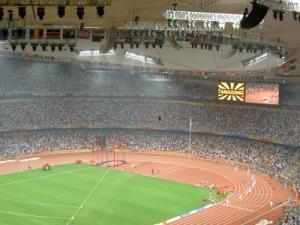
 Usain Bolt sets a 200-meter world record
Usain Bolt sets a 200-meter world record
Back in the Bird’s Nest, after the men’s hurdles semifinal, we witnessed Jamaican Usain Bolt’s history-making, record-breaking 200-meter triumph, and his ecstatic victory lap around the track. Fully expecting this result, the organizers had prepared for the crowd to sign happy birthday for him, and even flashed “AMAZING!” on the two huge TV screens on either end of the stadium – for a moment at least, here in Beijing, it truly seemed like anything was possible.